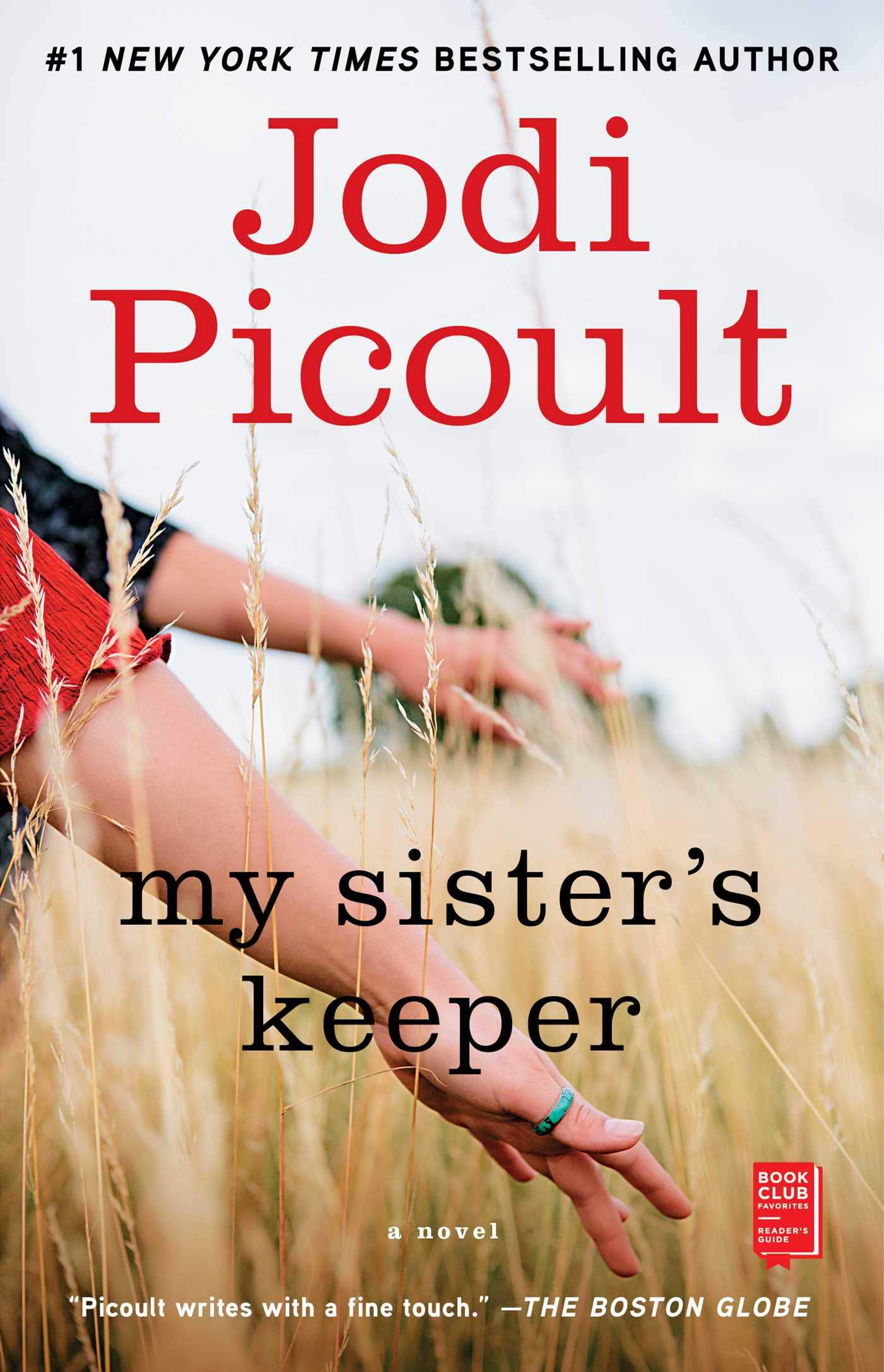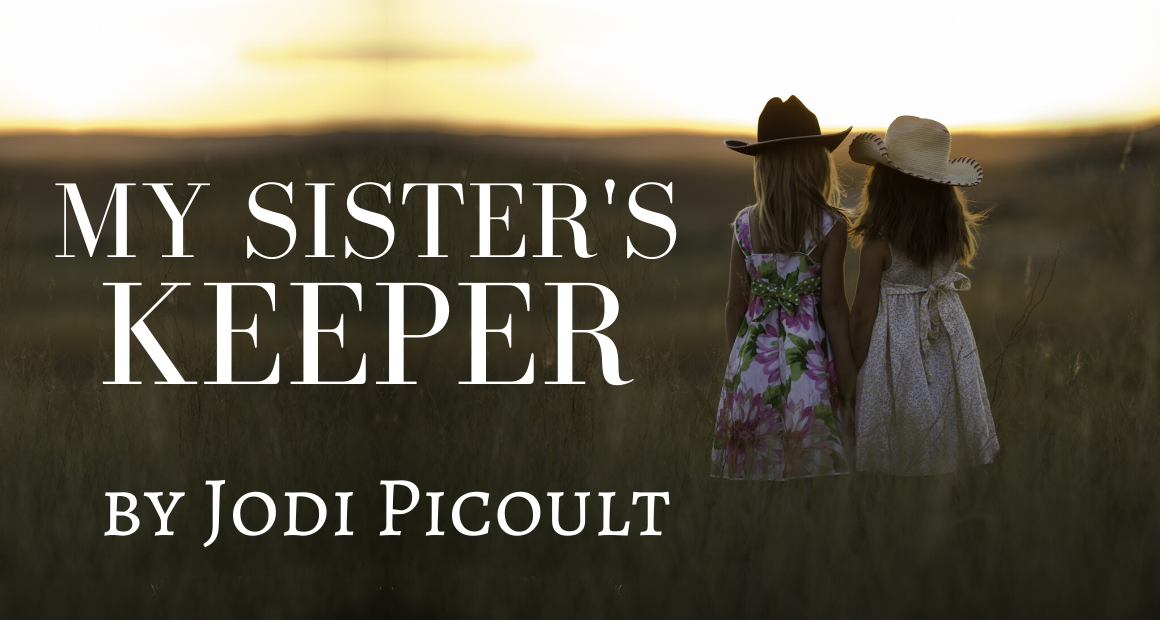Title: My Sister’s Keeper
Author: Jodi Picoult
Publisher: Washington Square Press
Genre: Contemporary fiction
First Publication: 2004
Language: English
Major Characters: Anna Fitzgerald, Sara Fitzgerald, Kate Fitzgerald, Brian Fitzgerald, Jesse Fitzgerald, Campbell Alexander, Julia Romana
Setting Place: Rhode Island
Theme: The Ambiguous Line Between Right and Wrong, The Bonds of Sisterhood, The Contrast Between Appearance and Reality
Narrator: First person, alternating between Anna, Jesse, Kate, Brian, and Sara Fitzgerald, Campbell Alexander, and Julia Romano.
Book Summary: My Sister’s Keeper by Jodi Picoult
Anna is not sick, but she might as well be. By age thirteen, she has undergone countless surgeries, transfusions, and shots so that her older sister, Kate, can somehow fight the leukemia that has plagued her since childhood. The product of preimplantation genetic diagnosis, Anna was conceived as a bone marrow match for Kate—a life and a role that she has never challenged… until now.
Like most teenagers, Anna is beginning to question who she truly is. But unlike most teenagers, she has always been defined in terms of her sister—and so Anna makes a decision that for most would be unthinkable, a decision that will tear her family apart and have perhaps fatal consequences for the sister she loves.
My Sister’s Keeper by Jodi Picoult is a provocative novel that raises some important ethical issues, My Sister’s Keeper is the story of one family’s struggle for survival at all human costs and a stunning parable for all time.
The book, My Sister’s Keeper by Jodi Picoult, is also available on Audible. It’s narrated by Richard Poe, Julia Gibson, Barbara McCulloh, Tom Stechschulte, Carol Monda, Jennifer Ikeda, Andy Paris.
Book Review: My Sister’s Keeper by Jodi Picoult
When Sara Fitzgerald discovers that her daughter Kate suffers from leukaemia, she decides that she will fight for her child’s life at all cost. Even if that cost is someone else’s life. And this is how Anna is born. The girl who has never belonged to herself, whose light has been smothered before having even touched the surface of her existence.
I believe it is everyone’s duty and right to help others. I believe it is everyone’s duty and right to help themselves. As a former lawyer, Sara sometimes doubts her decision to give up her career in the name of the family. She struggles with it. She does not have doubts whatsoever where her two daughters are concerned and about the role each of them needs to play in the other’s life. But when doubts go away, do we stop fighting?
Sara keeps struggling. Even though she is confident in her choice.
Does pain go away along with doubts?
“You don’t love someone because they’re perfect, you love them in spite of the fact that they’re not.”
Not always. Sometimes it is exactly when we know that we are right that the pain is the strongest. When Anna files a lawsuit against her parents, wanting a medical emancipation, she has no doubt that her daughter is in the wrong, that she wants to escape her responsibility to keep the family together by keeping her sister alive.
When we cannot save those we are responsible for, do we have the right to bestow this responsibility on someone else and expect them to act as we would? Even Anna herself cannot give us the response. She is not confident in her choices, because, really, she is faced with an impossible situation.
She does not accept being her sister’s guardian and not having a life of her own, she does not accept being independent and thus dooming her sister to death. Sometimes there is no right choice, there is not a happy ending, there are no heroes and villains. Only doubts. There is no right path for Anna. No matter what she chooses, she cannot live with it, she cannot be happy, she cannot forgive herself. Dying physically is only one form of dying.
“Maybe who we are isn’t so much about what we do, but rather what we’re capable of when we least expect it.”
Some of us die constantly, through the choices we –and others – get or don’t get to make. Through the many ifs and maybes and missed or wrongly chosen opportunities we face. Anna’s life is not her own, regardless of what choice she makes. For her it is over before having even begun. I know next to nothing about genetic engineering, but Anna’s story shows me that there is only so much we have the right to ask of another person.
There is only so much we have the right to create. I do believe in the noble motives of Sara Fitzgerald, but I do not believe in the validity of her choice. She decides to create a child with the intent to sacrifice it for the other one’s sake. All her love and care for Anna do not make up for that. Anna does not know where her place is, she feels like there isn’t really a place for her. And the universe seems to agree with her. She never gets to make the choice she so dreads of.
“Extraordinary things are always hiding in places people never think to look.”
At the time she finally receives her much craved freedom, she leaves this world. The child that never had to exist stops existing. There is no more struggle, no more dilemmas. It is over.
Through what Kate receives from her body after Anna is gone, a medical miracle happens and she seems to have gotten recovered from her disease. There are no more relapses. Doctors cannot explain it, but Kate believes that it is because Anna’s death makes up for her own.
But what life will Kate have from now on?
Will she be able to handle the cost at which she has it?





